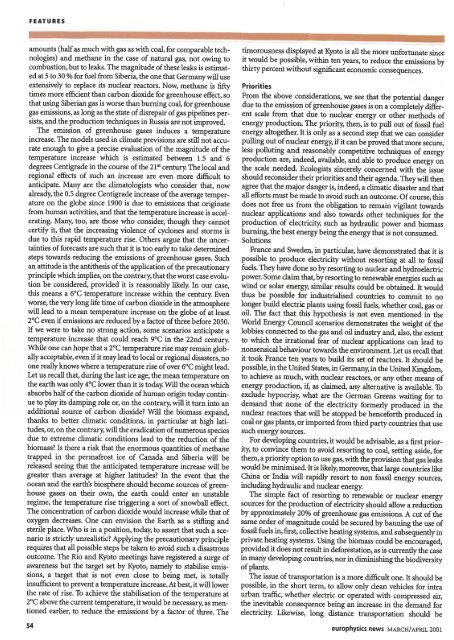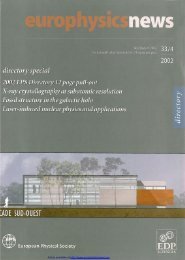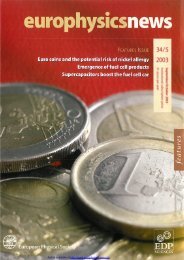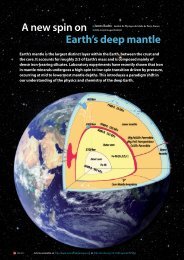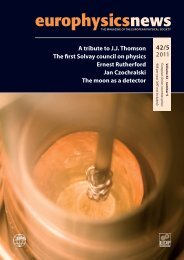Whole issue in PDF - Europhysics News
Whole issue in PDF - Europhysics News
Whole issue in PDF - Europhysics News
You also want an ePaper? Increase the reach of your titles
YUMPU automatically turns print PDFs into web optimized ePapers that Google loves.
FEATURES<br />
amounts (halfas much with gas as with coal, for comparable technologies)<br />
and methane <strong>in</strong> the case of natural gas, not ow<strong>in</strong>g to<br />
combustion, butto leaks. The magnitude ofthese leaks is estimatedat<br />
5 to 30 % for fuel from Siberia, the one that Germanywill use<br />
extensively to replace its nuclear reactors. Now, methane is fifty<br />
times more efficient than carbon dioxide for greenhouse effect, so<br />
that us<strong>in</strong>g Siberian gas is worse than burn<strong>in</strong>g coal, for greenhouse<br />
gas emissions, as long as the state ofdisrepair ofgas pipel<strong>in</strong>es persists,<br />
and the production techniques <strong>in</strong> Russia are not improved.<br />
The emission of greenhouse gases <strong>in</strong>duces a temperature<br />
<strong>in</strong>crease. The models used <strong>in</strong> climate previsions are still not accurate<br />
enough to give a precise evaluation of the magnitude of the<br />
temperature <strong>in</strong>crease which is estimated between 1.5 and 6<br />
degrees Centigrade <strong>in</strong> the course ofthe 21sI century. The local and<br />
regional effects of such an <strong>in</strong>crease are even more difficult to<br />
anticipate. Many are the climatologists who consider that, now<br />
already, the 0.5 degree Centigrade <strong>in</strong>crease ofthe average temperature<br />
on the globe s<strong>in</strong>ce 1900 is due to emissions that orig<strong>in</strong>ate<br />
from human activities, and that the temperature <strong>in</strong>crease is accelerat<strong>in</strong>g.<br />
Many, too, are those who consider, though they cannot<br />
certify it, that the <strong>in</strong>creas<strong>in</strong>g violence of cyclones and storms is<br />
due to this rapid temperature rise. Others argue that the uncerta<strong>in</strong>ties<br />
offorecasts are such that it is too early to take determ<strong>in</strong>ed<br />
steps towards reduc<strong>in</strong>g the emissions of greenhouse gases. Such<br />
an attitude is the antithesis ofthe application ofthe precautionary<br />
pr<strong>in</strong>ciple which implies, on the contrary, that the worst case evolution<br />
be considered, provided it is reasonably likely. In our case,<br />
this means a 6°C temperature <strong>in</strong>crease with<strong>in</strong> the century. Even<br />
worse, the very long life time ofcarbon dioxide <strong>in</strong> the atmosphere<br />
will lead to a mean temperature <strong>in</strong>crease on the globe of at least<br />
2°C even ifemissions are reduced bya factor ofthree before 2050.<br />
Ifwe were to take no strong action, some scenarios anticipate a<br />
temperature <strong>in</strong>crease that could reach 9°C <strong>in</strong> the 22nd century.<br />
While one can hope that a 2°C temperature rise may rema<strong>in</strong> globally<br />
acceptable, even ifit maylead to local or regional disasters, no<br />
one reallyknows where a temperature rise ofover 6°C might lead.<br />
Let us recall that, dur<strong>in</strong>g the last ice age, the mean temperature on<br />
the earth was only 4°C lower than it is today. Will the ocean which<br />
absorbs halfofthe carbon dioxide ofhuman orig<strong>in</strong> today cont<strong>in</strong>ue<br />
to play its damp<strong>in</strong>g role or, on the contrary, will it turn <strong>in</strong>to an<br />
additional source of carbon dioxide? Will the biomass .expand,<br />
thanks to better climatic conditions, <strong>in</strong> particular at high latitudes,<br />
or, on the contrary, will the eradication ofnumerous species<br />
due to extreme climatic conditions lead to the reduction of the<br />
biomass? Is there a risk that the enormous quantities ofmethane<br />
trapped <strong>in</strong> the permafrost ice of Canada and Siberia will be<br />
released see<strong>in</strong>g that the anticipated temperature <strong>in</strong>crease will be<br />
greater than average at higher latitudes? In the event that the<br />
ocean and the earth's biosphere should become sources ofgreenhouse<br />
gases on their own, the earth could enter an unstable<br />
regime, the temperature rise trigger<strong>in</strong>g a sort of snowball effect.<br />
The concentration ofcarbon dioxide would <strong>in</strong>crease while that of<br />
oxygen decreases. One can envision the Earth as a stifl<strong>in</strong>g and<br />
sterile place. Who is <strong>in</strong> a position, today, to assert that such a scenario<br />
is strictly unrealistic? Apply<strong>in</strong>g the precautionary pr<strong>in</strong>ciple<br />
requires that all possible steps be taken to avoid such a disastrous<br />
outcome. The Rio and Kyoto meet<strong>in</strong>gs have registered a surge of<br />
awareness but the target set by Kyoto, namely to stabilise emissions,<br />
a target that is not even close to be<strong>in</strong>g met, is totally<br />
<strong>in</strong>sufficient to prevent a temperature <strong>in</strong>crease.At best,itwill lower<br />
the rate of rise. To achieve the stabilisation of the temperature at<br />
2°C above the currenttemperature, itwould be necessary, as mentioned<br />
earlier, to reduce the emissions by a factor of three. The<br />
S4<br />
timorousness displayed at Kyoto is all the more unfortunate s<strong>in</strong>ce<br />
it would be possible, with<strong>in</strong> ten years, to reduce the emissions by<br />
thirty percent withoutsignificant economic consequences.<br />
Priorities<br />
From the above considerations, we see that the potential danger<br />
due to the emission ofgreenhouse gases is on a completely different<br />
scale from that due to nuclear energy or other methods of<br />
energy production. The priority, then, is to pull out offossil fuel<br />
energy altogether. It is only as a second step that we can co~ider<br />
pull<strong>in</strong>g out ofnuclear energy,ifit canbe proved that more secure,<br />
less pollut<strong>in</strong>g and reasonably competitive techniques of energy<br />
production are, <strong>in</strong>deed, available, and able to produce energy on<br />
the scale needed. Ecologists s<strong>in</strong>cerely concerned with the <strong>issue</strong><br />
should reconsider their priorities andtheir agenda. They will then<br />
agree that the major danger is, <strong>in</strong>deed, a climatic disaster and that<br />
all efforts must be made to avoid such an outcome. Ofcourse, this<br />
does not free us from the obligation to rema<strong>in</strong> vigilant towards<br />
nuclear applications and also towards other techniques for the<br />
production of electricity, such as hydraulic power and biomass<br />
burn<strong>in</strong>g, the best energy be<strong>in</strong>g the energy that is not consumed.<br />
Solutions<br />
France and Sweden, <strong>in</strong> particular, have demonstrated that it is<br />
possible to produce electricity without resort<strong>in</strong>g at all to fossil<br />
fuels. Theyhave done so byresort<strong>in</strong>g to nuclear andhydroelectric<br />
power. Some claim that,byresort<strong>in</strong>g to renewable energies such as<br />
w<strong>in</strong>d or solar energy, similar results could be obta<strong>in</strong>ed. It would<br />
thus be possible for <strong>in</strong>dustrialised countries to commit to no<br />
longer build electric plants us<strong>in</strong>g fossil fuels, whether coal, gas or<br />
oil. The fact that this hypothesis is not even mentioned <strong>in</strong> the<br />
World Energy Council scenarios demonstrates the weight ofthe<br />
lobbies connected to the gas and oil <strong>in</strong>dustry and, also, the extent<br />
to which the irrational fear of nuclear applications can lead to<br />
nonsensical behaviourtowards the environment. Let us recall that<br />
it took France ten years to build its set of reactors. It should be<br />
possible, <strong>in</strong>the United States, <strong>in</strong> Germany, <strong>in</strong>the United K<strong>in</strong>gdom,<br />
to achieve as much, with nuclear reactors, or any other means of<br />
energy production, if, as claimed, any alternative is available. To<br />
exclude hypocrisy, what are the German Greens wait<strong>in</strong>g for to<br />
demand that none of the electricity formerly produced <strong>in</strong> the<br />
nuclear reactors that will be stopped be henceforth produced <strong>in</strong><br />
coal or gas plants, or imported from third partycountries that use<br />
such energysources.<br />
For develop<strong>in</strong>g countries, it would be advisable, as a first priority,<br />
to conv<strong>in</strong>ce them to avoid resort<strong>in</strong>g to coal, sett<strong>in</strong>g aside, for<br />
them, a priority option to use gas, with the provision thatgas leaks<br />
wouldbe m<strong>in</strong>imised.Itis likely, moreover, thatlarge countries like<br />
Ch<strong>in</strong>a or India will rapidly resort to non fossil energy sources,<br />
<strong>in</strong>clud<strong>in</strong>g hydraulic and nuclear energy.<br />
The simple fact of resort<strong>in</strong>g to renewable or nuclear energy<br />
sources for the production ofelectricity should allow a reduction<br />
by approximately 20% of greenhouse gas emissions. A cut ofthe<br />
same order ofmagnitude could be secured by bann<strong>in</strong>g the use of<br />
fossil fuels <strong>in</strong>, first, collective heat<strong>in</strong>g systems, andsubsequently<strong>in</strong><br />
private heat<strong>in</strong>g systems. Us<strong>in</strong>g the biomass could be encouraged,<br />
provided it does not result <strong>in</strong> deforestation, as is currentlythe case<br />
<strong>in</strong>manydevelop<strong>in</strong>g countries, nor <strong>in</strong> dim<strong>in</strong>ish<strong>in</strong>g the biodiversity<br />
ofplants.<br />
The <strong>issue</strong> oftransportation is a more difficult one. It should be<br />
possible, <strong>in</strong> the short term, to allow only clean vehicles for <strong>in</strong>tra<br />
urban traffic, whether electric or operated with compressed air,<br />
the <strong>in</strong>evitable consequence be<strong>in</strong>g an <strong>in</strong>crease <strong>in</strong> the demand for<br />
electricity. Likewise, long. distance transportation should be<br />
europhysics news MARCHIAPRIL 2001


